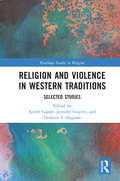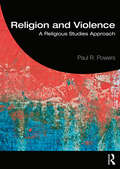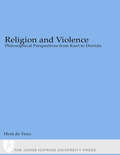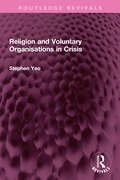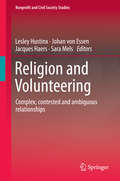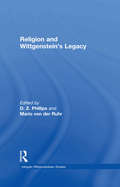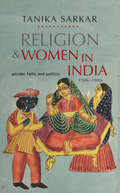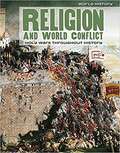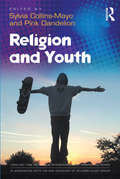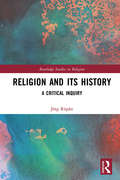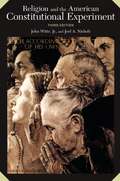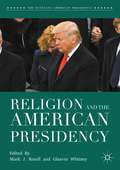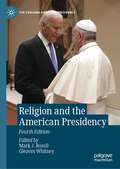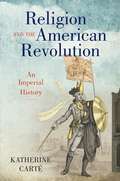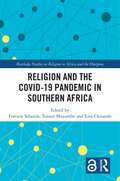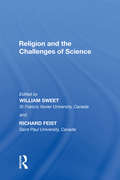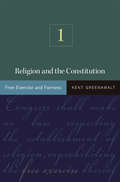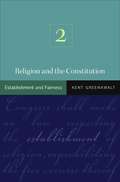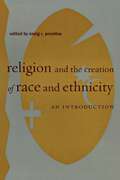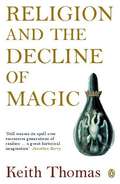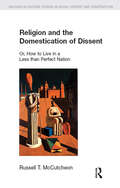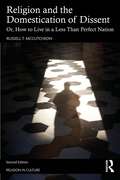- Table View
- List View
Religion and Violence in Western Traditions: Selected Studies (Routledge Studies in Religion)
by André GagnéThis book examines the connection between religion and violence in the Western traditions of the three Abrahamic faiths, from ancient to modern times. It addresses a gap in the scholarly debate on the nature of religious violence by bringing scholars that specialize in pre-modern religions and scriptural traditions into the same sphere of discussion as those specializing in contemporary manifestations of religious violence. Moving beyond the question of the “authenticity” of religious violence, this book brings together scholars from a variety of disciplines. Contributors explore the central role that religious texts have played in encouraging, as well as confronting, violence. The interdisciplinary conversation that takes place challenges assumptions that religious violence is a modern problem that can be fully understood without reference to religious scriptures, beliefs, or history. Each chapter focuses its analysis on a particular case study from a distinct historical period. Taken as a whole, these chapters attest to the persistent relationship between religion and violence that links the ancient and contemporary worlds. This is a dynamic collection of explorations into how religion and violence intersect. As such, it will be a key resource for any scholar of Religious Studies, Theology and Religion and Violence, as well as Christian, Jewish, and Islamic Studies.
Religion and Violence: A Religious Studies Approach
by Paul R. PowersDoes religion cause much of the world’s violence? Is religion inherently violent? Would violence disappear if religion did? Is true religion a force for peace? Is religion a mask for power and self-interest? What aspects of religion make violence more—or less—likely? Religion and Violence: A Religious Studies Approach explores the potential of classic social theories to shed light on the relationships between religion and violence. This accessible and engaging book starts from the premise that both religion and violence are ordinary elements of social life and that rather than causing violence religion plays a crucial role in the management of violence. Ideal for any student approaching the topic of religion and violence for the first time, this core textbook includes chapter overviews and summaries, guides for applying theory to real-world events, discussion questions, and case studies. Further teaching and learning resources are available on the accompanying companion website.
Religion and Violence: Philosophical Perspectives from Kant to Derrida
by Hent de VriesChosen as an Outstanding Academic Title for 2003 by Choice MagazineOriginally published in 2002. Does violence inevitably shadow our ethico-political engagements and decisions, including our understandings of identity, whether collective or individual? Questions that touch upon ethics and politics can greatly benefit from being rephrased in terms borrowed from the arsenal of religious and theological figures, because the association of such figures with a certain violence keeps moralism, whether in the form of fideism or humanism, at bay. Religion and Violence: Philosophical Perspectives from Kant to Derrida's careful posing of such questions and rearticulations pioneers new modalities for systematic engagement with religion and philosophy alike.
Religion and Voluntary Organisations in Crisis (Routledge Revivals)
by Stephen YeoFirst published in 1976, Religion and Voluntary Organisations in Crisis, analyses the experience of late nineteenth and early twentieth century organised religion by setting it in the context of the whole range of voluntary and other organisations. It provides a detailed study of churches and chapels in Reading set alongside the experience of a biscuit factory, football club, the hospital, the university, the WEA branch, the Social Democratic Federation, the Coop, and the other organisations. The interweaving of religion into the broad social history of the town gives a detailed and exciting picture of the social development of late nineteenth century England. It shows the part that religion had to play in the life of the locality in a very different society from our own and it explores the pressures on religion in the changing phases of capitalist development. This book is an essential read for scholars and researchers of religion, sociology of religion and history.
Religion and Volunteering
by Jacques Haers Lesley Hustinx Johan Von Essen Sara MelsReligion is considered a key predictor of volunteering: the more religious people are, the more likely they are to volunteer. This positive association enjoys significant support in current research; in fact, it could be considered the 'default perspective' on the relationship between both phenomena. In this book, the authors claim that, although the dominant approach is legitimate and essential, it nonetheless falls short in grasping the full complexity of the interaction between religion and volunteering. It needs to be recognized that there are tensions between religion and volunteering, and that these tensions are intensifying as a result of the changing meaning and role of religion in society. Therefore, the central aim and contribution of this book is to demonstrate that the relationship between religion and volunteering is not univocal but differentiated, ambiguous and sometimes provocative. By introducing the reader to a much wider landscape of perspectives, this volume offers a richer, more complex and variable understanding. Apart from the established positive causality, the authors examine tensions between religion and volunteering from the perspective of religious obligation, religious change, processes of secularization and notions of post-secularity. They further explore how actions that are considered altruistic, politically neutral and motivated by religious beliefs can be used for political reasons. This volume opens up the field to new perspectives on religious actors and on how religion and volunteering are enacted outside Western liberal and Christian societies. It emphasizes interdisciplinary perspectives, including theology, philosophy, sociology, political science, anthropology and architecture.
Religion and Wittgenstein's Legacy (Ashgate Wittgensteinian Studies)
by Mario von RuhrWittgenstein was one of the greatest philosophers of the twentieth century. In this collection, distinguished Wittgenstein scholars examine his legacy for the philosophy of religion by examining key areas of his work: Wittgenstein's Tractatus; Frazer's 'Golden Bough'; and the implications of his later philosophy for the understanding of religion. Assessments are also provided of the philosophical and theological reception of his work. The collection provides an invaluable resource for graduate and undergraduate teaching of Wittgenstein in relation to religion.
Religion and Women in India: Gender, Faith, and Politics, 1780s–1980s
by Tanika SarkarExamines the intersections of gender, religion, and politics among various Indian religious communities, from early British rule to the late twentieth century.In Religion and Women in India, Tanika Sarkar provides an account of gender prescriptions and proscriptions and their operation among various Indian religious communities, beginning with early British rule and concluding in the late twentieth century. Tracking various shifts and displacements in doctrinal thought and practice, she argues that Indian modernity was initiated largely through debates on gender, scripture, custom, and caste, which shaped ideal forms of masculine and feminine conduct. She demonstrates the organization of a modern public sphere around the controversies, cultural imaginaries, and political agitations over such issues as the age of consent, child marriage, widow remarriage, rape laws, and intercaste and interfaith relations. Gender norms are shown leaching into social attitudes, labor processes, and legal rights-leading eventually to modern Indian feminism. Closely analyzing the interpenetration and co-constitution of religion, politics, and gender in India, while also comparing parallel developments in Pakistan and Bangladesh, this pioneering work offers a brilliant and synthesizing account of the battles between orthodoxy and its opponents over two hundred years. No historian, no feminist, no student of politics can afford to miss it.
Religion and World Conflict
by Caroline KennonReligion has been at the heart of many wars and acts of violence throughout history. Why is this such a deep-rooted source of conflict around the world, and what can be done to foster peace between people of different religions instead? <p><p> Readers are presented with these questions and more to challenge their critical-thinking skills as they learn about the relationship between religion and conflict, from ancient history to the Crusades to the rise of ISIS. Facts and opposing viewpoints are presented in the main text and sidebars, which are enhanced by the use of annotated quotations and primary sources.
Religion and Youth (Theology and Religion in Interdisciplinary Perspective Series in Association with the BSA Sociology of Religion Study Group)
by Pink DandelionWhat is the future of religion given the responses of young people? What impact do existing religious forms have on youth? What kind of spirituality and religion are young people creating for themselves? Religion and Youth presents an accessible guide to the key issues in the study of youth and religion, including methodological perspectives. It provides a key teaching text in these areas for undergraduates, and a book of rigorous scholarship for postgraduates, academics and practitioners. Offering the first comprehensive international perspective on the sociology of youth and religion, this book reveals key geographical and organisational variables as well as the complexities of the engagement between youth and religion. The book is divided into six parts organised around central themes: Generation X and their legacy; The Big Picture - surveys of belief and practice in the USA, UK and Australia; Expression - how young people construct and live out their religion and spirituality; Identity - the role of religion in shaping young people's sense of self and social belonging; Transmission - passing on the faith (or not); Researching Youth Religion - debates, issues and techniques in researching young people's religion and spirituality. James A. Beckford writes the Foreword and Linda Woodhead the Epilogue.
Religion and its History: A Critical Inquiry (Routledge Studies in Religion)
by Jörg RüpkeReligion and its History offers a reflection of our operative concept of religion and religions, developing a set of approaches that bridge the widely assumed gulf between analysing present religion and doing history of religion. Religious Studies have adapted a wide range of methodologies from sociological tool kits to insights and concepts from disciplines of social and cultural studies. Their massive historical claims, which typically idealize and reify communities and traditions, and build normative claims thereupon, lack a critical engagement on the part of the researchers. This book radically rethinks and critically engages with these biases. It does so by offering neither an abridged global history of religion nor a small handbook of methodology. Instead, this book presents concepts and methods that allow the analysis of contemporary and past religious practices, ideas, and institutions within a shared framework.
Religion and the American Constitutional Experiment
by John Witte Jr. Joel A. NicholsThis updated edition of Religion and the American Constitutional Experiment provides a comprehensive, multidisciplinary overview of the history, theory, law, and comparative analysis of American religious liberty from the earliest colonial period through the most recent Supreme Court cases. In accessible, jargon-free language, the authors present balanced discussions of controversial issues, including the funding of religious schools and charities and displaying religious symbols on government property. Three chapters new to this edition cover the free exercise of religion, religion and public life, and religious organizations and the law. In addition, the authors address seven new cases, and an expanded concluding chapter places the American experience in a global context by comparing contemporary American religious liberty law with international human rights standards.
Religion and the American Constitutional Experiment
by John Witte Jr. Joel A. NicholsThe third edition of this classic book provides a comprehensive, multidisciplinary overview of the history, theory, law, and comparative analysis of American religious liberty from the earliest colonial period through the most recent Supreme Court cases. The authors present balanced, accessible discussions of controversial issues, such as funding religious schools and charities and displaying religious symbols on government property. Three chapters new to this edition cover the free exercise of religion, religion and public life, and religious organizations and the law. In addition, an expanded concluding chapter places the American experience in global context by comparing contemporary American religious liberty law with international human rights standards.
Religion and the American Constitutional Experiment (3rd Edition)
by John Witte Jr. Joel A. NicholsThis volume offers a novel reading of the American constitutional experiment in religious liberty. The First Amendment, John Witte argues, is a synthesis of both the theological convictions and the political calculations of the eighteenth-century American founders. The founders incorporated six interdependent principles into the First Amendment-liberty of conscience, freedom of exercise, equality of faiths, plurality of confessions, disestablishment of religion, and separation of church and state. Both the nuance and the balance of these six principles have often been lost on current interpreters of the First Amendment. Particularly the Supreme Court has tended to reduce the First Amendment to mechanical tests and metaphorical formulae that often replace, rather than guide, its analysis and application of these principles. First Amendment doctrine today has thus become notoriously confused, casuistic, and self-contradictory. Religion and the American Constitutional Experiment urges a return to the principled approach to religious rights, evident both in the American founding era and in the modern international human rights movement. Witte uses these principles to analyze the free exercise and establishment case law of the last two centuries. He then illustrates the virtues of his principled approach through analysis of the thorny contests over tax exemptions for religions, the role of religion in the public school, among others. This lucid and engaging volume serves both as a provocative primer for students and a pristine restatement for specialists in law, religion, history, politics, and American studies. Through a fresh reading of the sources and cases, and through the discovery and introduction of several new materials, the author reclaims the essential value, vigor, and vitality of our most cherished religious rights and liberties.
Religion and the American Presidency
by Mark J. Rozell Gleaves WhitneyThis volume opens a new avenue toward understanding the politics and policies of many US presidents. As the essays in this book reveal, religion has had an enormous impact on many critical presidencies in US history. Contrary to the conventional wisdom, these essays reveal the deeply religious side to Truman, Eisenhower, and Reagan, among others.
Religion and the American Presidency (The Evolving American Presidency)
by Mark J. Rozell Gleaves WhitneyThis book chronologically analyzes fourteen key US Presidents, from Washington to Biden, to highlight how religion has informed or influenced their politics and policies. For years, leading scholars have largely neglected religion in presidential studies. Yet, religion has played a significant role in a number of critical presidencies in US history. This volume reveals the deep religious side to such presidents as Truman, Eisenhower, and Reagan, among others, and the impact that faith had on their administrations. Now in its fourth edition, this work includes analysis of Joe Biden as the second Catholic president in United States history and provides a timely update to a key text in the study of religion and the presidency.
Religion and the American Revolution: An Imperial History
by Katherine CartéFor most of the eighteenth century, British protestantism was driven neither by the primacy of denominations nor by fundamental discord between them. Instead, it thrived as part of a complex transatlantic system that bound religious institutions to imperial politics. As Katherine Carte argues, British imperial protestantism proved remarkably effective in advancing both the interests of empire and the cause of religion until the war for American independence disrupted it. That Revolution forced a reassessment of the role of religion in public life on both sides of the Atlantic. Religious communities struggled to reorganize within and across new national borders. Religious leaders recalibrated their relationships to government. If these shifts were more pronounced in the United States than in Britain, the loss of a shared system nonetheless mattered to both nations. Sweeping and explicitly transatlantic, this book demonstrates that if religion helped set the terms through which Anglo-Americans encountered the imperial crisis and the violence of war, it likewise set the terms through which both nations could imagine the possibilities of a new world.
Religion and the American West: Belief, Violence, and Resilience from 1800 to Today
by Jessica Lauren NelsonReligion and the American West offers a lavishly illustrated and comprehensive overview of the ways religion has shaped the idea of the American West and how the region has influenced broader religious and racial categories. Starting when the concept of the &“American West&” emerged in the early 1800s and continuing the analysis through modern times, Religion and the American West explores the interplay between a wide range of American belief systems, from established world religions to new spiritual innovations.A stunning selection of material and print culture illustrates the varied range of religious expressions across the history of the American West. Taken as a whole, the contributors challenge longstanding definitions of the American West and provide a new narrative that recenters our attention on the lived experiences of diverse peoples and communities. It also serves as the companion publication for the exhibition &“Acts of Faith,&” opening fall 2023 at the New York Historical Society. Religion and the American West is a story of vibrant innovation and tragic conflict, showcasing how historical actors and modern-day readers wrestle with the meaning of religious belief in the American West.
Religion and the COVID-19 Pandemic in Southern Africa (Routledge Studies on Religion in Africa and the Diaspora)
by Fortune Sibanda, Tenson Muyambo and Ezra ChitandoThis book investigates the role of religion in the context of the COVID-19 pandemic in Southern Africa. Building on a diverse range of methodologies and disciplinary approaches, the book reflects on how religion, politics and health have interfaced in Southern African contexts, when faced with the sudden public health emergency caused by the pandemic. Religious actors have played a key role on the frontline throughout the pandemic, sometimes posing roadblocks to public health messaging, but more often deploying their resources to help provide effective and timely responses. Drawing on case studies from African indigenous knowledge systems, Islam, Rastafari and various forms of Christianity, this book provides important reflections on the role of religion in crisis response. This book will be of interest to researchers across the fields of African Studies, Health, Politics and Religious Studies. The Open Access version of this book, available at http://www.taylorfrancis.com, has been made available under a Creative Commons Attribution-Non Commercial-No Derivatives 4.0 license.
Religion and the Challenges of Science
by William Sweet Richard FeistDoes science pose a challenge to religion and religious belief? This question has been a matter of long-standing debate - and it continues to concern not only scholars in philosophy, theology, and the sciences, but also those involved in public educational policy. This volume provides background to the current 'science and religion' debate, yet focuses as well on themes where recent discussion of the relation between science and religion has been particularly concentrated. The first theme deals with the history of the interrelation of science and religion. The second and third themes deal with the implications of recent work in cosmology, biology and so-called intelligent design for religion and religious belief. The fourth theme is concerned with 'conceptual issues' underlying, or implied, in the current debates, such as: Are scientific naturalism and religion compatible? Are science and religion bodies of knowledge or practices or both? Do religion and science offer conflicting truth claims? By illuminating contemporary discussion in the science-religion debate and by outlining the options available in describing the relation between the two, this volume will be of interest to scholars and to members of the educated public alike.
Religion and the Constitution, Volume 1: Free Exercise and Fairness
by Kent GreenawaltBalancing respect for religious conviction and the values of liberal democracy is a daunting challenge for judges and lawmakers, particularly when religious groups seek exemption from laws that govern others. Should members of religious sects be able to use peyote in worship? Should pacifists be forced to take part in military service when there is a draft, and should this depend on whether they are religious? How can the law address the refusal of parents to provide medical care to their children--or the refusal of doctors to perform abortions? Religion and the Constitution presents a new framework for addressing these and other controversial questions that involve competing demands of fairness, liberty, and constitutional validity. In the first of two major volumes on the intersection of constitutional and religious issues in the United States, Kent Greenawalt focuses on one of the Constitution's main clauses concerning religion: the Free Exercise Clause. Beginning with a brief account of the clause's origin and a short history of the Supreme Court's leading decisions about freedom of religion, he devotes a chapter to each of the main controversies encountered by judges and lawmakers. Sensitive to each case's context in judging whether special treatment of religious claims is justified, Greenawalt argues that the state's treatment of religion cannot be reduced to a single formula. Calling throughout for religion to be taken more seriously as a force for meaning in people's lives, Religion and the Constitution aims to accommodate the maximum expression of religious conviction that is consistent with a commitment to fairness and the public welfare.
Religion and the Constitution, Volume 2: Establishment and Fairness
by Kent GreenawaltBalancing respect for religious conviction and the values of liberal democracy is a daunting challenge for judges and lawmakers, particularly when religious groups seek exemption from laws that govern others. Should students in public schools be allowed to organize devotional Bible readings and prayers on school property? Does reciting "under God" in the Pledge of Allegiance establish a preferred religion? What does the Constitution have to say about displays of religious symbols and messages on public property? Religion and the Constitution presents a new framework for addressing these and other controversial questions that involve competing demands of fairness, liberty, and constitutional validity. In this second of two major volumes on the intersection of constitutional and religious issues in the United States, Kent Greenawalt focuses on the Constitution's Establishment Clause, which forbids government from favoring one religion over another, or religion over secularism. The author begins with a history of the clause, its underlying principles, and the Supreme Court's main decisions on establishment, and proceeds to consider specific controversies. Taking a contextual approach, Greenawalt argues that the state's treatment of religion cannot be reduced to a single formula. Calling throughout for acknowledgment of the way religion gives meaning to people's lives, Religion and the Constitution aims to accommodate the maximum expression of religious conviction that is consistent with a commitment to fairness and the public welfare.
Religion and the Creation of Race and Ethnicity: An Introduction (Religion, Race, and Ethnicity #2)
by Craig R. PrentissThe first collection to distinguish religion's role in the creation of race and ethnic categoriesReligion and the Creation of Race and Ethnicity is the first collection devoted to demonstrating the role that religion and myth have played in the creation of the categories of “race” and “ethnicity.” When scholars approach religion and race, they tend to focus on such issues as how African Americans have expressed Christianity, or how Japanese or Mexicans have lived “religiously.” This volume, meant specifically for those new to the field, brings together an ensemble of prominent scholars and illuminates instead the role religious myths have played in shaping those very social boundaries that we call “races” and “ethnicities.” It asks, what part did Christianity play in creating “Blackness”? To what extent was Japanese or Mexican identity itself the product of religious life?The text, comprised of all original material, introduces readers to the social construction of race and ethnicity and the ways in which these concepts are shaped by religious narratives. It offers examples from both the U.S. and around the world, exploring these themes in the context of places as diverse as Bosnia, India, Japan, Mexico, Zimbabwe, and the Middle East. The volume helps make the case that any account of the social construction of race and ethnicity will be incomplete if it fails to consider the influence of religious traditions and myths. Contributors include: Eddie S. Glaude, Jr., Joel Martin, Jacob Neusner, Roberto S. Goizueta, Laurie Patton, and Michael A. Sells.
Religion and the Decline of Magic: Studies in Popular Beliefs in Sixteenth and Seventeenth-Century England
by Sir Keith ThomasWitchcraft, astrology, divination and every kind of popular magic flourished in England during the sixteenth and seventeenth centuries, from the belief that a blessed amulet could prevent the assaults of the Devil to the use of the same charms to recover stolen goods. At the same time the Protestant Reformation attempted to take the magic out of religion, and scientists were developing new explanations of the universe. Keith Thomas's classic analysis of beliefs held on every level of English society begins with the collapse of the medieval Church and ends with the changing intellectual atmosphere around 1700, when science and rationalism began to challenge the older systems of belief.
Religion and the Domestication of Dissent: Or, How to Live in a Less Than Perfect Nation (Religion in Culture)
by Russell T. McCutcheonSince the events of 9/11 the representation of Islam has increasingly come adrift from its actuality. Scholars and pundits have effectively demonised a whole faith by wilfully apportioning blame and by ignoring the differences within the Islamic movement. 'Religion and the Domestication of Dissent' examines how the classifications we use to name and negotiate our social worlds - notably 'religion' - are implicitly political. The study ranges widely from contemporary film and art to the War on Terror and will be invaluable to readers interested in the politics behind the portrayal of dissenting religious groups.
Religion and the Domestication of Dissent: Or, How to Live in a Less Than Perfect Nation (Religion in Culture)
by Russell T. McCutcheonIn its first edition, Religion and the Domestication of Dissent focused on the representations of Islam that circulated in the wake of the 9/11 attacks—representations that scholars, pundits, and politicians alike used either to essentialize and demonize it or, instead, to isolate specific aspects as apolitical and thus tolerable faith. This little book’s larger thesis therefore argued for how the classifications that we routinely use to identify and thereby negotiate our social worlds—notably such categories as “religion” or “faith”—are explicitly political.This new edition, which updates the first and adds a new closing chapter, continues to be relevant today—a time when assertions concerning supposedly authentic and homogenous identities (whether shared by “us” or “them”) continue to animate a variety of public debates where the stakes remain high. Thinking back on how Islam was often portrayed in scholarship and popular media in western Europe and North America offers lessons for how debates today unfold on such topics as Christian nationalism—a designation now prominent among pundits intent on identifying the proper and improper ways in which religion intersects with modern political life. But it is this very distinction (between religion and politics) that ought to be attracting our attention, if we are interested not in which way of being religious is right or reasonable but, instead, in determining why some social groups are known as religious in the first place. Seeing the latter question as linked to studying how socially formative categories function in liberal democracies, Religion and the Domestication of Dissent offers an anthropology of the present, when the longstanding mechanisms of liberal governance seem to be under threat.
